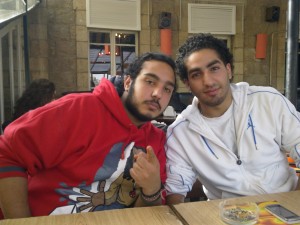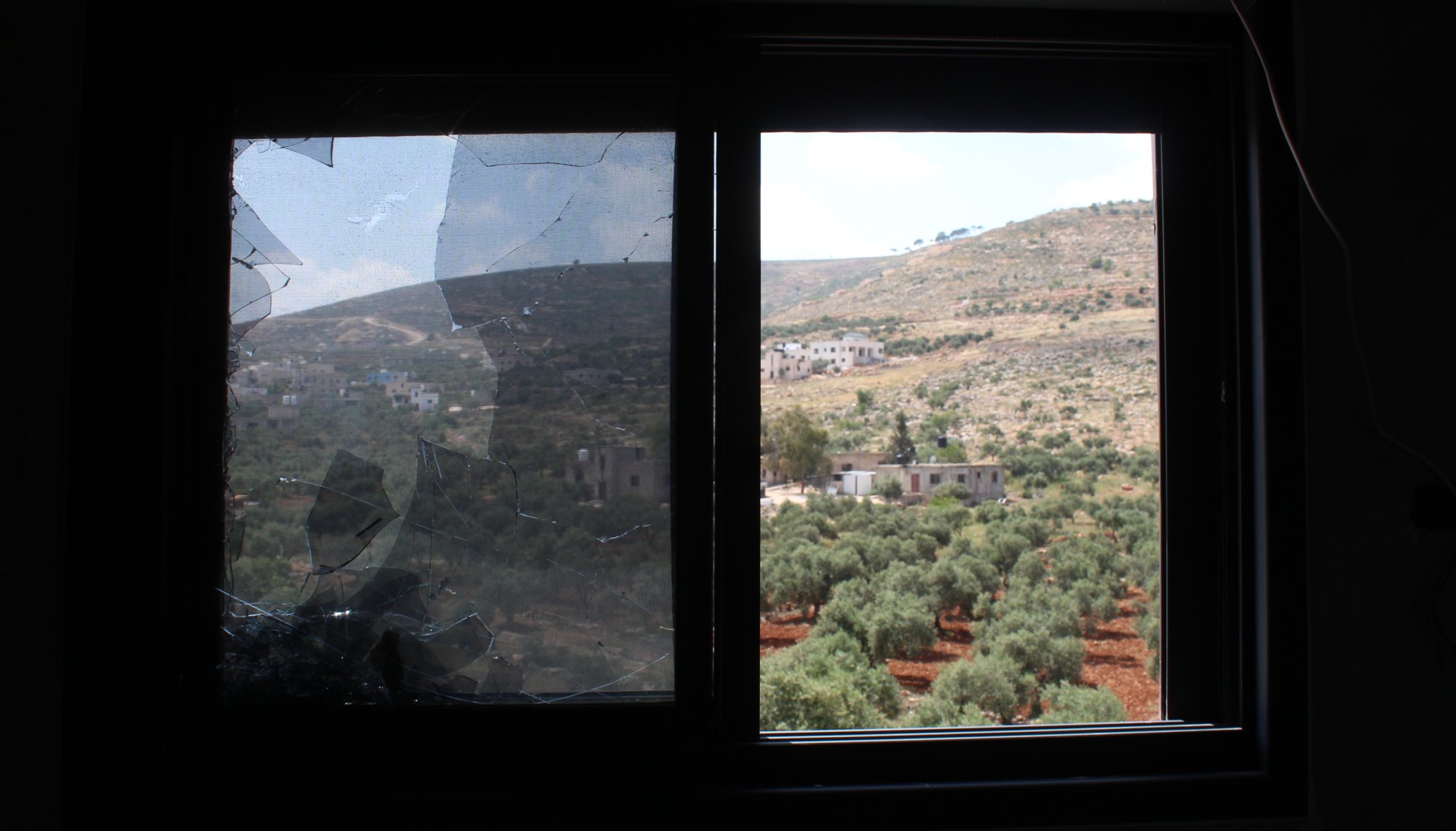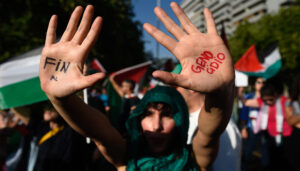By Amira Jaradat
For Thaer Fahmawi, 19, hip hop is more than just a style of music. “ I breathe hip hop. I eat hip hop. I wake up, I start beatboxing before I do anything.”
Fahmawi is a member of 962 Street (or Share3 962), known as “Jordan’s official hip-hop movement,” a crew made up of MCs, producers, break dancers, beatboxers and a graffiti artist. Right now, his plans for the future are few and, if he decides to continue working toward his high school diploma, he won’t have the opportunity to retake his Tawjihi exams until next semester. But while his education is on the backburner, his beatboxing is taking him to new heights.
Before getting into beatboxing, Fahmawi was a popper, dancing in Shmeisani’s Culture Street with friends and stopping passersby. “When we first started, we would get kicked out a lot,” he said. “It was very hard because there’s no place to practice.” He transitioned to beatboxing after being shown a clip of Justin Timberlake by Zuka Zain, who has since become an award-winning popper in Jordan and Lebanon. Zain showed Fahmawi a clip of Timberlake beatboxing on the track “Rock Your Body,” went to get lunch and came back to find that Fahmawi had taught himself the entire segment. “They were like ‘Thaer, stick to beatboxing.’” In 2008, Fahmawi performed as part of the crew for the first time at the Amman Summer Festival’s hip hop night. His most recent public appearance was on November 11, when he co-hosted Nemr Abou Nassar’s show alongside his friend Ripsta, a local MC.
Ripsta, or Mohammad Abu Ghazaleh, 23, was born in Jordan but spent 16 years in New Jersey, USA. He has been rapping for 11 years, but for the first six, he kept his rhymes to himself. “I used to breakdance, but nobody knew that I rapped,” said Abu Ghazaleh. Instead, he spent these years honing his skills, listening to other people freestyle and trying to keep himself from jumping in. “I wanted to go to the streets as a professional, not as a beginner,” he said. His interest in hip hop was encouraged partly by his brother MC Maze, a member of 962 Street, but also by the music of Tupac Shakur. “For me, he proved to the whole world what rap is,” said Abu Ghazaleh. “He was revolutionary and he left his mark when he died.”
 When they were invited to co-host Nemr Abou Nassar’s comedy event last month, Fahmawi and Abu Ghazaleh were each contacted separately and the pair of friends were surprised to see they’d be working together again. They were also surprised to be asked to host a comedy show to begin with. “We never expected it,” said Fahmawi. They decided to put their own spin on it, beatboxing and rapping their introductions to the crowd. “We had a lot of fun,” said Abu Ghazaleh, who especially enjoyed the time spent joking backstage. “Nemr is a great guy,” said Fahmawi. He is also, according to his hosts, a big hip hop fan.
When they were invited to co-host Nemr Abou Nassar’s comedy event last month, Fahmawi and Abu Ghazaleh were each contacted separately and the pair of friends were surprised to see they’d be working together again. They were also surprised to be asked to host a comedy show to begin with. “We never expected it,” said Fahmawi. They decided to put their own spin on it, beatboxing and rapping their introductions to the crowd. “We had a lot of fun,” said Abu Ghazaleh, who especially enjoyed the time spent joking backstage. “Nemr is a great guy,” said Fahmawi. He is also, according to his hosts, a big hip hop fan.
Both Fahmawi and Abu Ghazaleh prefer listening to underground and old-school artists than those that are popular in the Western mainstream today. “Hip hop in the Middle East is conscious, it’s life stories,” said Abu Ghazaleh. “In Jordan, it needs to be about something like politics, about how people live, the streets.” He is against embracing the gangster lifestyle and bringing that aspect into the music.”We want people to respect hip hop,” said Abu Ghazaleh. “We don’t want to do it in a gangster way.”
“We don’t talk about money, cars, girls, no,” said Fahmawi. “We talk about issues.” According to Fahmawi, Jordanian hip hop has Western roots, but the distinct Arab flavor is present in their music. “As long as you’re creative, you can do whatever when it comes to hip hop,” said Fahmawi. “When you do combinations between popping and beatboxing, it’s creative. When you mix instruments, it’s creative.” According to Abu Ghazaleh, they’ll be mixing it up soon on a new track with Mixtoura, a local alternative band.
Both Fahmawi and Abu Ghazaleh have faced criticism for pursuing hip hop and have been accused of trying to copy the West. “[People say], it’s not ours, it’s for the Americans, it’s for the Africans,” said Abu Ghazaleh. “No it’s not; it’s music. It’s like speech; it’s something you can prove your point with, you can say whatever you want with it. In the end, it’s poetry.”
“A lot of people ask us why we’re doing something that isn’t for us,” said Fahmawi. “But when an Arab artist adds techno music to his songs, they don’t tell him no.” The meeting of the East and West in Arabic pop music has become common place, and in Arab hip hop, the language has the ability to become part of the message. For example, Syrian Omar Offendum references the fact that he is bilingual in his single “Destiny” and Iraqi-Canadian “The Narcicyst” switches languages depending on his content. Abu Ghazaleh raps in English, which, according to his friend, means that “…his message is, I can sing and I can rap and do whatever in your language. [In Arabic] it’s different. It’s, here, we got it from you, but we’re rapping in Arabic.”
According to Fahmawi and Abu Ghazaleh, the biggest obstacle hip hop faces in Jordan is a lack of sponsors. Amer Al-Taher of 962 Street, who Fahmawi calls “one of the best in the Middle East,” reportedly has an entire album ready that he cannot afford to release. Another problem is the limited number of record labels in Jordan.
Gaining support for hip hop in Jordan has been an uphill battle, but according to Fahmawi, it’s “improving every day.” In the meantime, both performers speak of the importance of supporting each other and other local talents for the sake of keeping hip hop alive. Even though he is not a member of the crew, Abu Ghazaleh says he always supports 962 Street and comes out to Fahmawi’s shows to cheer him on. “He’s my friend, I listen to him every day,” said Abu Ghazaleh. “I might get bored of him sometimes, but I see him as one of the best.”
“Hopefully, inshallah, soon we’re going to sign a contract with a company and they’re going to sell our album,” said Abu Ghazaleh. In the meantime, both men are holding onto their day jobs, but also working on keeping up their skills. No matter what, neither of the friends is planning on giving up on hip hop any time soon. “Even if I want to stop, I can’t,” said Fahmawi. “It’s in our blood.”










